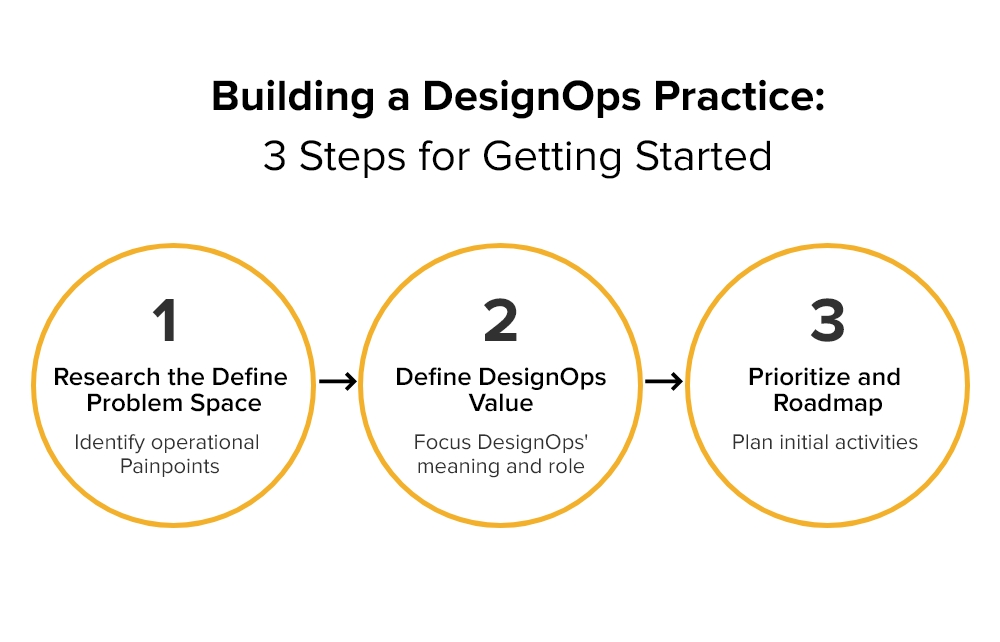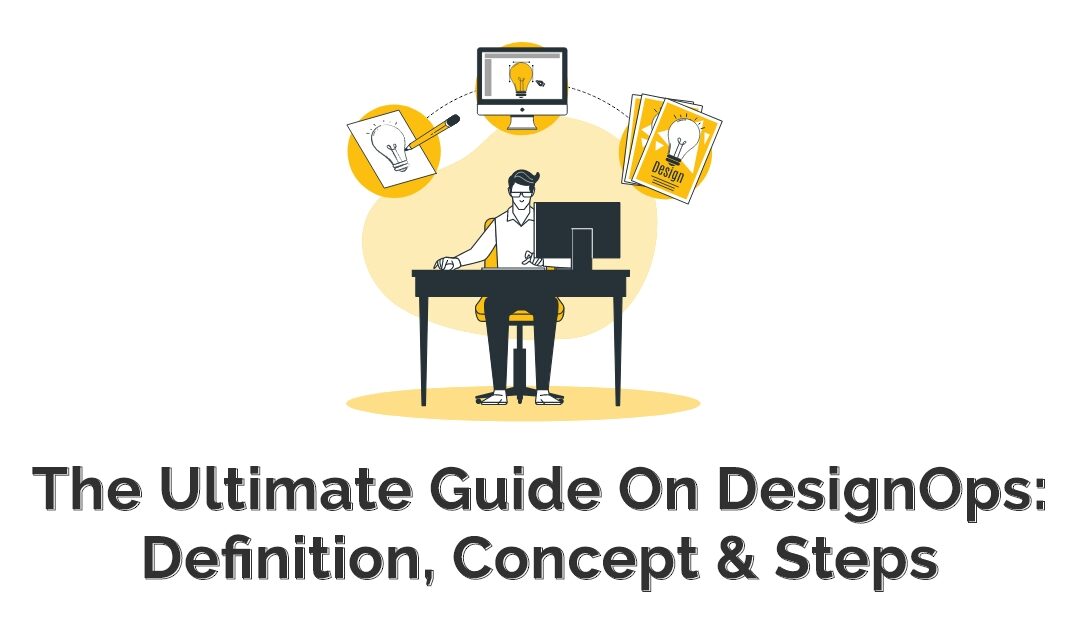DesignOps points to the orchestration and optimization of people, methods, and craft to amplify design value and impression at scale.
It is a cumulative word for discussing challenges such as:
- Expand and enhancing design teams
- Search and hiring people with the right skills
- Create effective workflows
- Enhance the quality and impact of design outputs.
The purpose of DesignOps is to set methods and standards that regulate scalable clarifications for these requests. It helps designers to concentrate on designing and researching. It helps to know what is DesignOps.
Each field will have its solutions, and DesignOps is ours. UX experts have more need than most for figuring out how to effectively handle more. We often develop at a faster rate than the rest of the company. As the company knows the value and high ROI of UX, they rapidly add staff and responsibility to the UX team.
Schedule Your 30 Minutes FREE Consultation
How Can You Implement DesignOps?
In reality, design-team difficulties are immense, so there are multiple focus areas for DesignOps Summit. This extensive view of exciting points is fascinating for companies trying to establish themselves in DesignOps for the first time. While its identity is positively increasing, most companies have relatively low DesignOps maturity, lack of reliability, served as DesignOps teams and their comparative start. It means there are few proven, time-tested models to study or follow.

We use various ways to implement the DesignOps and its primary steps in companies for implementations. There are essentially 3 levels that companies adopt to recognize where to invest in DesignOps.
It takes actions flexibly and quantitatively:
Research The Problem Space
The primary step in creating a DesignOps practice is figurative steps. There is no need to dive straight into outlining and enforcing activities. Preferably, plan to design a DesignOps experience such as any other design problem. Identify and explain the difficulties first, to make a better solution.
The DesignOps menu describes a complete set of operations companies prefer to concentrate on when planning and executing methods to support designers. It is difficult for a single person or team to focus on these areas at once. The research phase identifies the most effective pain points and the areas with the enormous potential ROI within this creation of possibilities so that DesignOps exercises are adjusted accordingly.
The interview documents have a modern design process, as observed by both designers and non-designers. Document design projects and methods used everywhere in the design process, tools and people involved at each step, and quantitative metrics pinpoint areas of waste and value. These metrics are effective when proposing the exclusion or addition of design activities, meetings, or tools.
Define DesignOps Value
Analyzing and integrating current challenges that promote conversation about if and what is DesignOps & bring an advantage to the organization. The research phase has certainly highlighted pain points within the 3 panels of the DesignOps menu. This pain points shape planned efforts or initiatives.
First, specify the potential areas of possibility where they are helpful. We base it on the research, where the most effective pain points are. There is a need to highlight the key areas of interest beyond the DesignOps menu and establish a merged and convenient subset of DesignOps center areas particular to the identified pain points.
They build agreement for the recently shaped DesignOps purpose, and advanced roles or resources required to deliver it. There is a need to research, solve the merged DesignOps focus areas, and involve sources on a roadshow. It presents the idea to stakeholders, solicits feedback, and improves as necessary.
Prioritize & Roadmap
There is a need to set up objectives, plans, also primary tactical projects within a flexible timeline.
When companies start investment for DesignOps works established, evade the appeal to create tactics quickly and instinctively. It is time to recognize a primary set of significant activities resolved within a consistent timeline and measured.
There is a need to produce a convenient set of primary initiatives, such as knowing a strategic goal referred to each prioritized pain point. After this, brainstorm tactical objectives that assist these necessary goals. Tactical objectives are particular and measurable, such as tactical goals that promote increased perception of the UX team’s value.
The Concept Of DesignOps
It is to assist the design team in association with the customer-centric vision of the company. It appears with a focus on our customers.
The designers have tools and methods to respond to the customer. There is a need for permission to look to the prospective teams to communicate with a relevant vision that provides deep customer relationships.
Significant customer experiences are where they start their actions for products and services designers create responsibility. It is for how a customer appears across the drive employing various touchpoints and communications within a company.
The inputs guide the design team’s capability to fulfill the aim by facilitating communication at scale for the organization.
Its purpose shows why the design team continues and how they succeed. A design team grows, and becomes holistic, strategic, generating better value for the organization.
We know that talent allows a positive employee experience, affects the company’s ability to engage, develop top talent, and concentrates on capabilities and behaviors associated with the purpose. It helps to know the concept of what is DesignOps also implemented later.
Why Is DesignOps Important?
The associations with designers, product managers, and engineers assure individuals are working with the corresponding strategic product goals in mind.
The DesignOps Summit is relevant for product managers for various reasons:
DesignOps helps product directors to make sure designers & their cross-functional product team are engaging in close communication with the product’s development team.
In this, The product managers assure that design and design have coordinated their schedules such that design delivers its work back to expansion at regular intervals. Impediments decrease or delay as the team has to serve for the other to finish its work.
Product managers designate sources because a DesignOps professional estimates how many designers a project will require. It also helps in scheduling additional design resources mid-project when necessary.
That’s why we use it in multiple stages. When we know their process, we quickly understand what is DesignOps and its purpose.
Our Approach For DesignOps In Our Team
UIUX Studio adequately includes DesignOps in our works. Mostly two comprehensive methods we use in our UI UX design company. One involves allowing specific roles or even hiring new people & the other needs only a shift in thinking.
Create DesignOps Culture
In this approach, we require focusing our team’s thinking to produce and design a more combined part of the product’s development plans and schedule.
We estimate design team sources and hours required for development cycles, developing those plans into broader expansion timeframes, and deciding when improvement passes its work off to design.
In DesignOps culture, anyone from our team works as the lead, a product manager, design team member, or stakeholder. It does not involve assigning DesignOps as a role or hiring a new person. There is a need for a variation in thinking and support beyond the cross-functional product team. We know it does not work independently but in a similar partnership with the product and development teams.
Set up a Standalone Role
It is a comparatively new term. DesignOps plan has swiftly increased with more advanced product businesses. The correlating design performance within a broader context of the cross-functional product team. It has been thriving enough so that DesignOps experts and entire companies are becoming more common.
A design ops expert comes from a design background, a product background, or a project management background. Our User Experience Design Firm offers various services related to designing. Hire UI Design agency is the best way to expand your business worldwide and increase your online presence.
Let us chat on Skype for more information. We are pleased to serve you.
